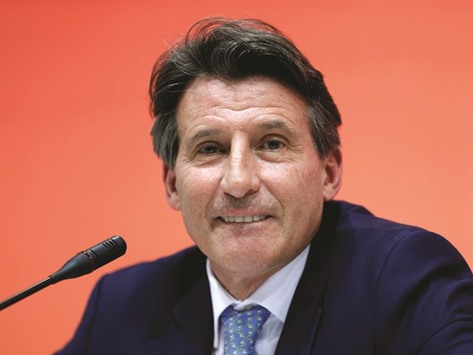Yuliya Stepanova’s participation at the European Championships was proof of the IAAF’s consistency on anti-doping whistle blowers, world track and field supremo Sebastian Coe said yesterday.
In an interview with a small group of journalists in Amsterdam, Coe launched a fresh plea for athletes to turn informants should they encounter doping, saying it was a “historic moment” for athletics.
Stepanova herself served a two-year doping ban before she and her husband Vitaly made startling revelations about state-sponsored doping in Russian athletics. Associated, widespread corruption with the International Association of Athletics Federations (IAAF) plunged the body into its worst-ever crisis, just as Coe was installed as president in place of now-disgraced Lamine Diack.
Russian athletes were promptly suspended from international competition in November and now face a race a raft of criteria to meet before even being in with a chance to compete at the Rio Olympics.
But Stepanova, now exiled in the United States, was handed the chance to compete as a “neutral” as recompense for her speaking out on the systematic doping at the heart of Russian athletics. “She fulfilled the eligibility criteria set down by the IAAF taskforce and anti-doping review board and the invitation was at the behest of European Athletics,” Coe said of Stepanova, who tore a ligament in her heel during her 800m heat on Wednesday and was later disqualified.
“Without her support and the evidence she gave the taskforce, we would not have understood as much about the challenge to be confronted. You have to be consistent. If you are asking athletes to step up to the plate and not just be commentators sitting in the background... then I think you have to say that those that are prepared to do that should be recognised for that.
“The athletes have a very clear role to play. I don’t mind athletes showing passion and being outspoken about this, but they also have a responsibility to help us and position themselves as part of the solution rather than just sitting there and saying ‘Well I didn’t get a medal because....’
“They do need to be in a position where they’re really prepared to stick their heads above the parapet. They know more about it than any of us. They’re there, at the side of the track, they’re in the training groups, they know the coaches not doing it with integrity. They can help us and that’s really important.”
Coe added of Stepanova’s muted comeback: “I don’t want this just to be the end of the story. And I make this offer to all athletes.
“If you think you can help us get through this pathology quicker, if you can help us understand the nature of the challenge that we’re dealing with... it’s a golden opportunity that is not necessarily going to present itself again for our sport to grab this moment, this is a historic moment.”
Coe confirmed that 136 Russian athletes had applied to the IAAF for the right to compete at the Rio Games. Each would be examined on a case-by-case basis, he said, refusing to discuss individuals.
“There is an anti-doping review board looking at the individual cases that have come before them.
“And we are very clear that any athlete that would be eligible would have to be living out of the system for an appropriate period of time and be in systems that we are all comfortable about and have the same type of safeguards that athletes in other well regulated systems and structure would have.”
The former middle-distance runner, who won two Olympic 1500m gold medals for Britain in the 1980 and 1984 Games, said he had felt bolstered by the support he had received from other sports.
“When I came out of the Olympic Summit in Lausanne a few days after the Vienna decision (last month to extend Russia’s ban), I was very comforted by the approach the IOC took,” he said.
“The federation presidents, the senior members of the executive board, the larger NOCs (National Olympic Committees), we all coalesced around the concept of creating a level playing field for competitors. This is a really important moment, not just for my sport but sport more broadly.”
Complete Russian ban unfair: Bach
International Olympic Committee president Thomas Bach believes that banning all Russians from August’s Rio Olympics would be unfair even if a report rules that Russia manipulated doping tests at the 2014 Sochi Winter Games. A World Anti-Doping Agency Commission will announce its findings into the Sochi allegations before July 15. Russian track and field athletes are already banned following a separate WADA report, although clean athletes may still be able to compete.
“The mandate of the investigation refers to the Winter Olympics in Sochi,” the head of the International Olympic Committee told German media
yesterday. “You can not for example punish a Russian badminton player if you penalise possible manipulation at the WADA laboratories at the Winter Games in Sochi.”
German Bach has been accused by critics in his homeland of being too close to Russian President Vladimir Putin but he made no apologies
for that perception. “When you talk about me in Germany as a ‘Russian sympathiser’, I take that as a compliment,” he said. “Here again we talk about fairness. The fact is we have of course worked very well together with Russia and Mr. Putin in the preparation and the organisation of the Winter Olympics.”

Sebastian Coe
